Poodle Training Timeline [First 6 months Guide]
poodles, like all dogs, require tons of patience, routine, and regularity on the part of their trainers. Luckily for poodle owners, poodles are a lot more receptive to training than other breeds, which makes our job slightly easier.
Still, training a dog is a journey mapped in inches, not miles. Therefore, it’s extremely important that trainers continually remind themselves why they’re training their puppy.
Poodle Training Tips
Contrary to popular belief, we train the dog for the dog’s sake. A well-trained poodle is better prepared to live in the admittedly unnatural urban environments we humans have long adjusted to. Training helps with anxiety, sociability, and general adaptability.
That said, there are a few basic training tips that we can cover before running through our poodle training timeline.
Variety Is Key
Dogs’ brains are very different than our own, and we must take that into account when training them. Let’s imagine that you want to train your dog to sit. Very patiently, you spend time every day training your dog “sit” until he can do it on command every time. You don’t even need to give a treat anymore, but your dog still responds to the command.
Then, you take your dog to the park. He’s off-leash and you want to practice “sit” with him. You say the command, but he won’t do it. What’s his problem, you think to yourself.
Dogs don’t just rely on the words we say to know what we want them to do. They rely on the context. If you train “sit” in the kitchen every day, your dog will know how to sit in the kitchen, not in the park and possibly not even in the dining room.
Thus, train your dog in as many situations as possible: on leash and off, in the park, in the kitchen, and in the basement; even in the car or at friends’ houses.
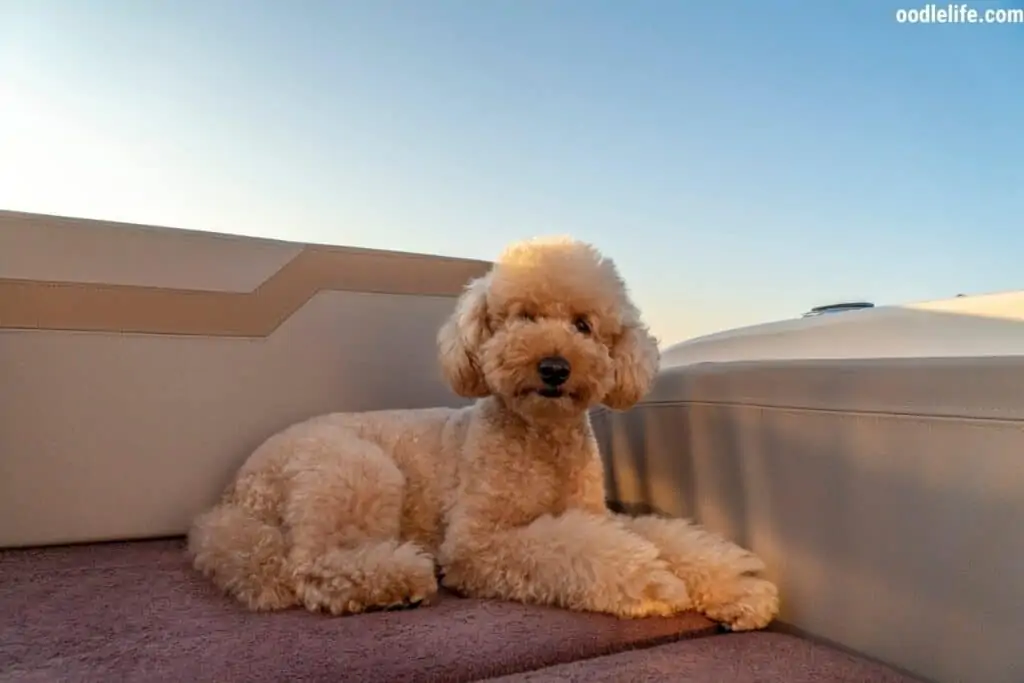
Keep Training Sessions Brief And Fun
Especially when your pup is young, keep formal training sessions brief and fun. Poodle pups, like all puppies, have really short attention spans. If you try to continue training your pup longer than the attention threshold, you’re only asking to be very frustrated without achieving anything from it.

Poodle Puppy Training At Home (First 30 Days)
Poodle puppies in the first thirty days of their lives are not even technically puppies yet. We call them neonates as they are still quite underdeveloped (puppies are born blind, for example).
It is very unlikely that anyone reading this article will be in possession of neonates, as neonates must be around their mother for breastfeeding and socialization with the litter. Generally, puppies are given around eight weeks to their new owners, but there is a lot of things the breeder can do to prepare the neonates for their future lives.
The breeder can, among other things, begin socializing the dog by exposing it to more than 100 people, begin chew toy training, potty train, and teach basic commands like sit, down, and roll over.
The above is, however, quite rare, which means all these things typically must be done by the new owner when he or she adopts the dog.
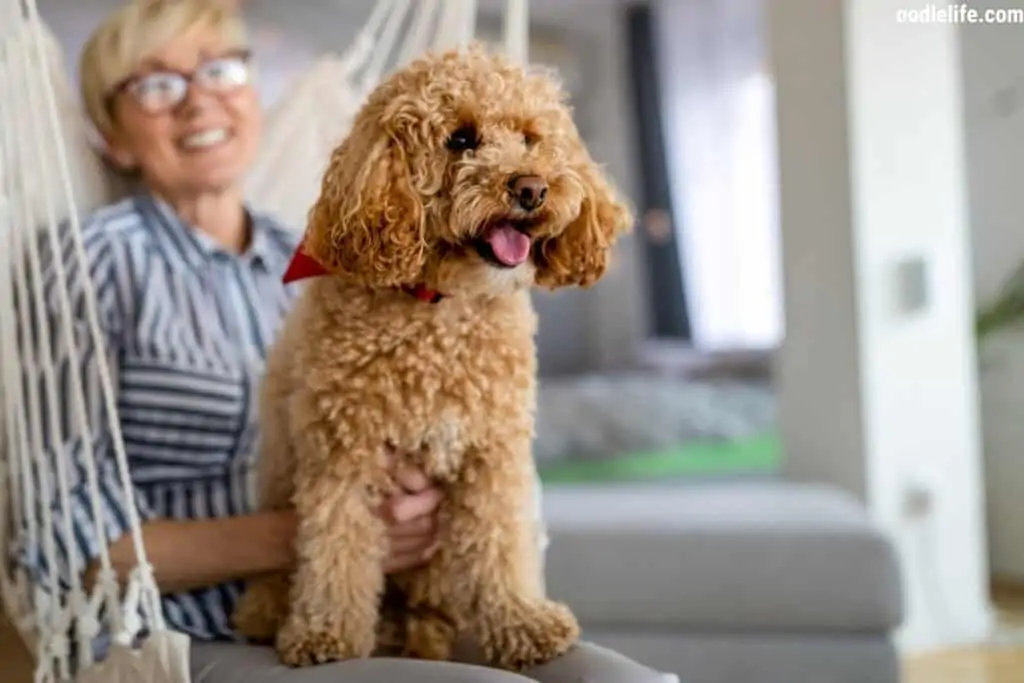
Poodle Puppyhood – The First Week At Home
When you get your dog home, training begins immediately. In the first week, your poodle puppy should be house-trained, should have some command over “sit,” “stay,” “lie down,” and other basic tricks.
Although at this point, your puppy isn’t vaccinated and therefore shouldn’t be taken on walks outside the home, you still need to begin leash training and socialization. Bring as many friends and strangers as you can to your house. Have them come in and give your dog a treat for sitting or lying down. Let them pet the dog and touch its ears gently. This prepares it for handling by the vet when it’s time for vaccines.
When training, be sure to train your puppy with the leash on. This will help you control it when it is out of line but also gets it accustomed to the leash when it’s time to start walking.
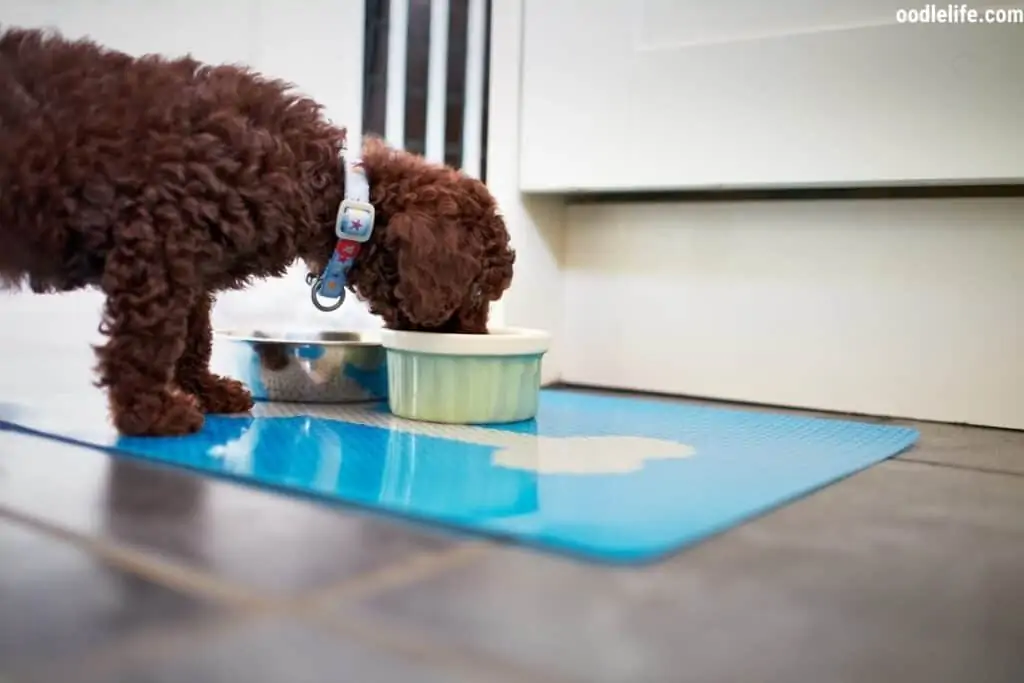
Poodle Puppy Preschool (The Second Week Until Three Months)
What I’ve christened poodle puppy preschool coincides with the critical period of socialization. Puppies, at this point, should be meeting as many others as it possibly can. It should have contact with many, many different human beings from all walks of life.
The puppy should be exposed to people in hats, men with mustaches, old men, and children. They all should interact with the dog, so it can begin to understand that humans, small and large, represent no threat to your poodle puppy.
This is also the time in which you should be training your dog in bite inhibition. Bite inhibition is incredibly important and not to be overlooked.
If a puppy is not trained how to bite, it can cause serious damage when it is an adult dog. Training your dog to chew on chew toys, for example, is a good way to train bite inhibition.
Also, puppies will naturally want to nibble on your hand. Between eight weeks and three months, this is completely acceptable behavior. If they hurt you, say “ow” and pout for a little bit, letting them know that they hurt you. Your efforts in this now will allow your puppy to understand the strength of its own bite. When it’s an adult, therefore, it won’t (like Lenny from Mice and Men) cause damage it didn’t mean to.
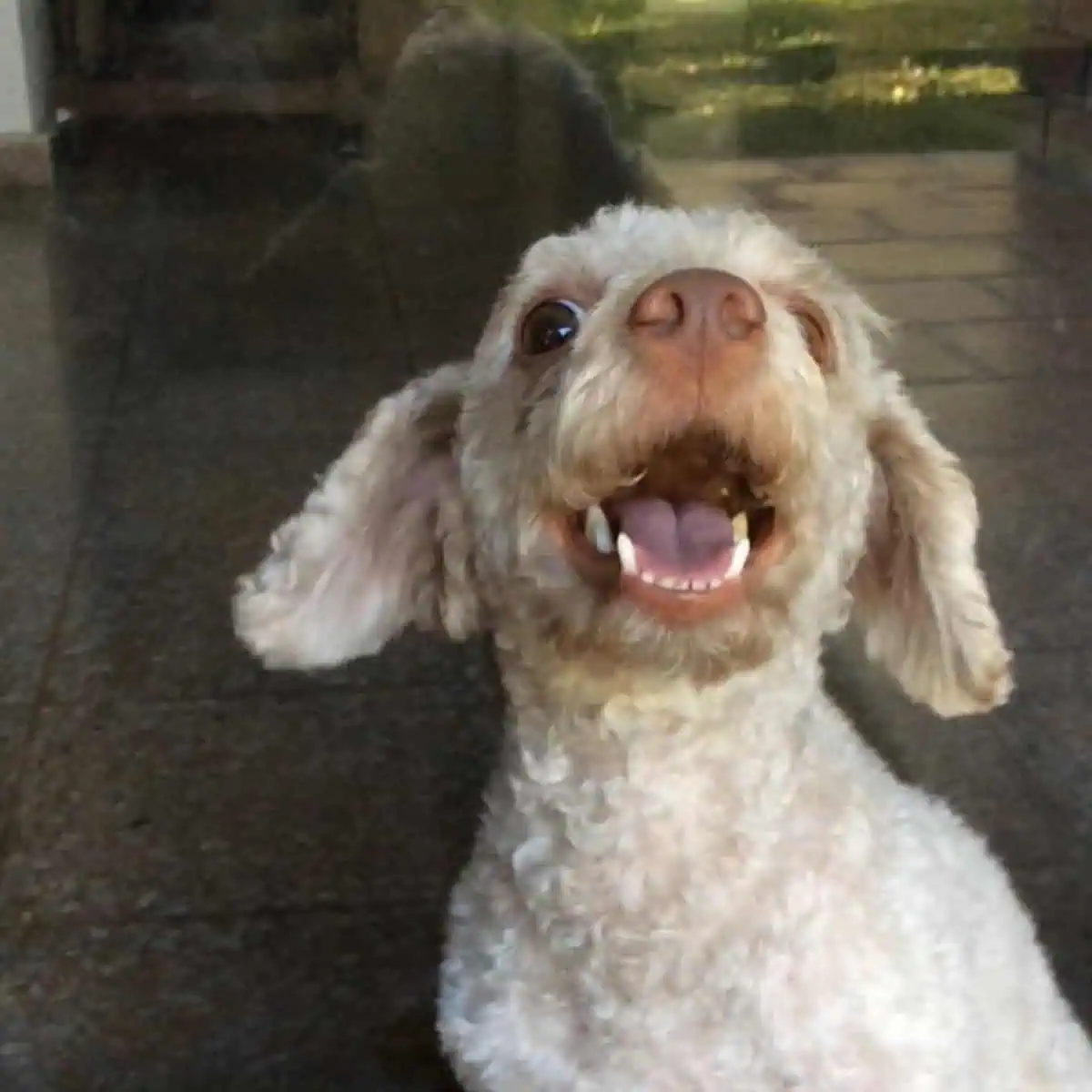
Poodle Puppy Kindergarten (Three Months To Six Months)
Between three months and six months, your poodle puppy should be going out into the great wide world! Extensive leash training is necessary in this stage. You want to get your poodle pup accustomed to the sights and sounds of the outside world.
In particular, begin to notice what kinds of stimuli make your dog nervous. Cars? People on bicycles? Men with suspenders? Whatever these stimuli are, begin to classically condition your dog to like these things. Whenever one of these stimuli comes close to your dog, give it a treat or some praise. It will begin to associate the positive feelings of eating with the people on bikes or the cars, and its nervousness will be conditioned away.
Around the end of this time period, your dog’s “hunter” reflex will start to kick in: it will start to notice squirrels, and if it’s a male, it may even begin to hunch other dogs. Your “well-trained” puppy will begin to display signs of rebellion and insubordination. Never mind: this is natural. Simply double down with the training.
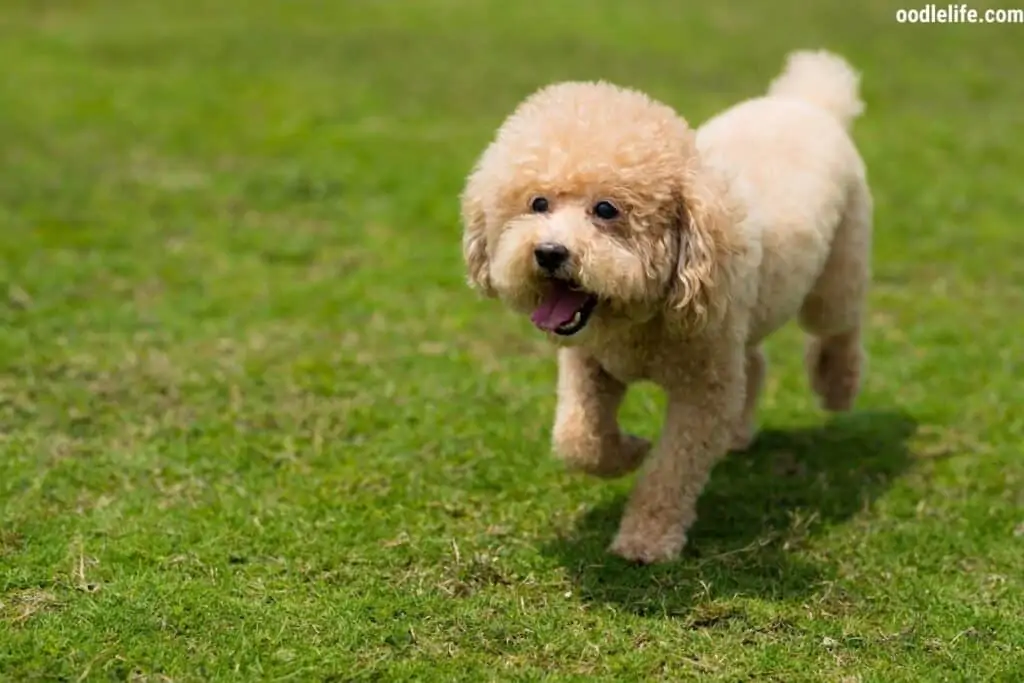
Poodle Puppy High School (Six Months To Eighteen Months)
From six months to eighteen months, your poodle puppy is a true teenager. Juvenility, with all its awkwardness and difficulties, is as real for poodle puppies as it is for humans. Male dogs, especially, will begin picking fights at the dog park. Training, meanwhile, will continue to regress. Your dog may even make a mistake in the house if you’re not careful!
In this critical period, socialization remains as important as ever. Take your dog to the dog park weekly and continue leash training as well as house training. You can begin to experiment with some fun things, too, like agility training.
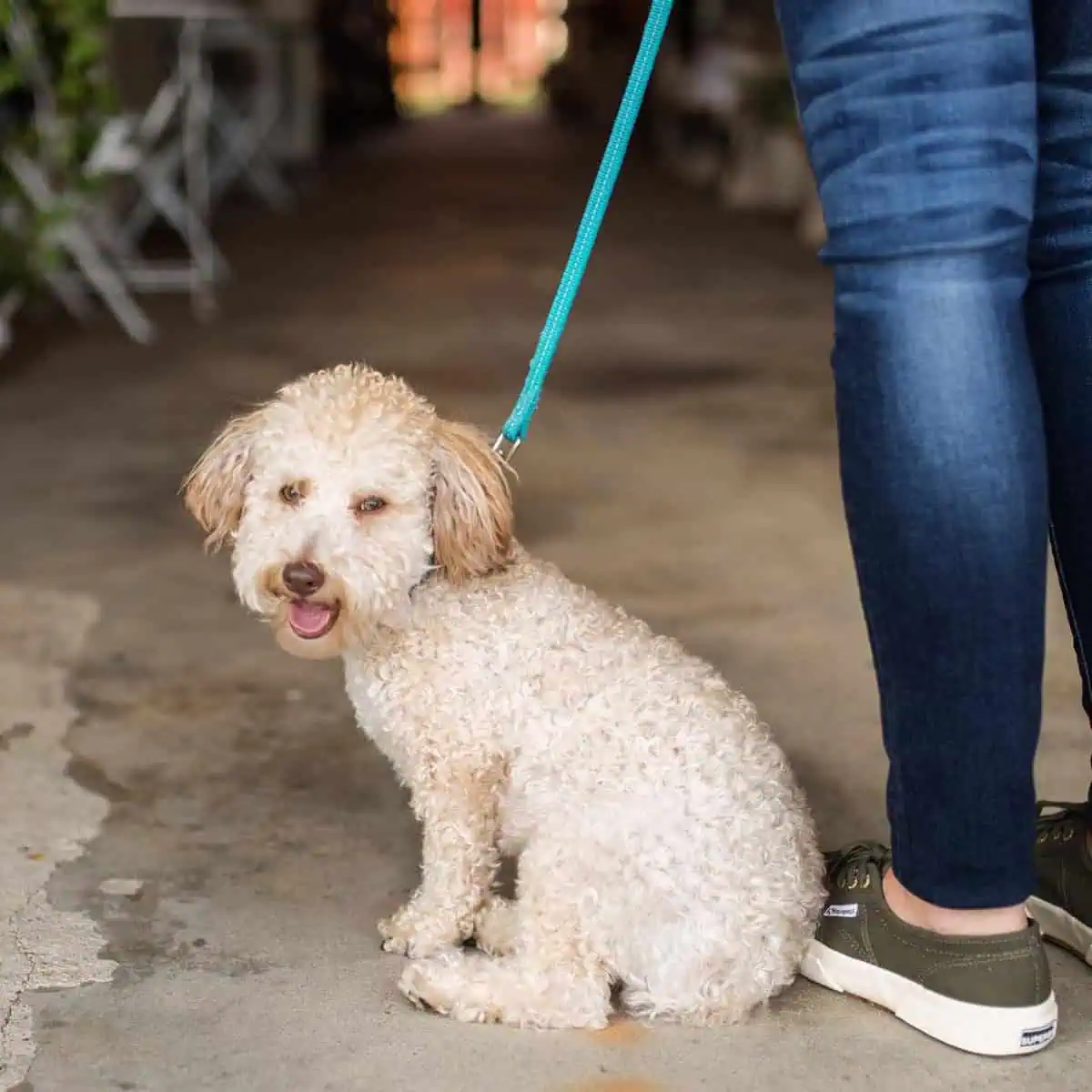
Sweet Adulthood
At a certain point after poodle high school, your poodle puppy grows up. Luckily, you won’t ever be an empty nester because poodles almost never leave home for college.
Your poodle may calm down considerably at this stage and begin to feel more self-confident and self-contained, but you need to redouble training efforts.
There is no day off for training, even in adulthood. Continue to reward good habits and address behavioral issues before they can creep into the status of habit. If you do this, you’ll have a well-behaved poodle pup whose twilight years will be the best time you have with them.